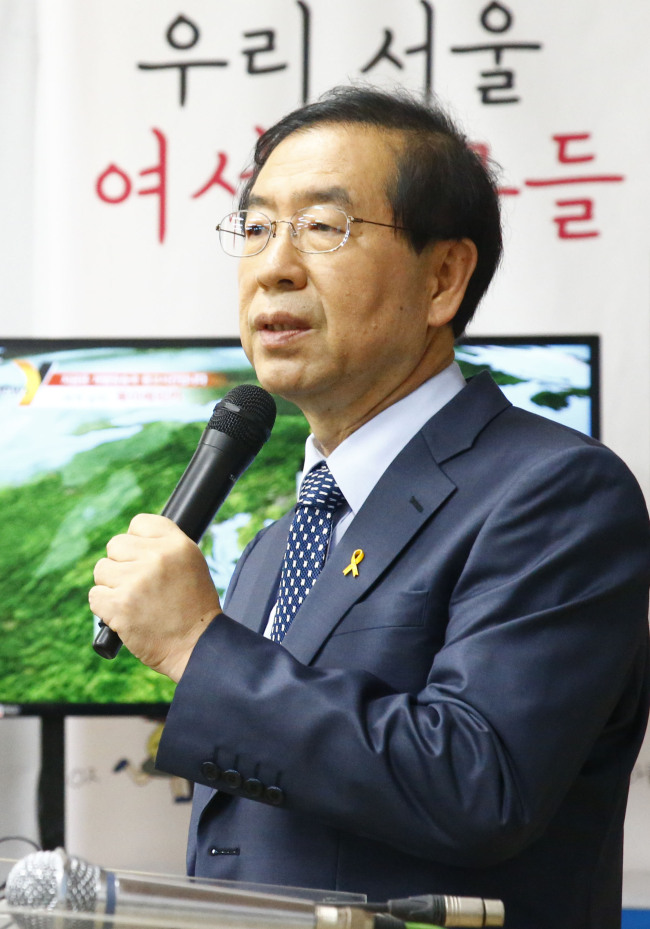[Newsmaker] Park seals second term with clear election win
By Korea HeraldPublished : June 4, 2014 - 23:57
Park Won-soon of the main opposition New Politics Alliance for Democracy defeated conservative candidate Chung Mong-joon in the Seoul mayor election Wednesday.
Turnout among Seoul’s 8.4 million voters was 58.6 percent.
Chung’s defeat in a key battleground district deals a political blow to President Park Geun-hye and the Saenuri Party, but President Park’s past leadership in political crises has been resilient.
Turnout among Seoul’s 8.4 million voters was 58.6 percent.
Chung’s defeat in a key battleground district deals a political blow to President Park Geun-hye and the Saenuri Party, but President Park’s past leadership in political crises has been resilient.

This year’s face-off between civic activist-turned-mayor Park and seven-term lawmaker Chung featured last month’s Sewol ferry disaster and the candidates’ families as major points in the campaign affecting voter sentiment.
Despite his credentials as a billionaire, a former FIFA vice president and a presidential candidate in 2002, Chung saw his approval ratings plummet to as low as 34 percent in the wake of the Sewol tragedy, while Park’s stayed above 40.
A Facebook post by Chung’s youngest son calling the bereaved families of the Sewol accident “uncivilized” two days after the maritime disaster most likely exacerbated the fall in support.
Chung launched a last-ditch assault in the final weeks by accusing Park of ignoring an official audit report that said there were leftover pesticides in public school meals. He also accused Kang Nan-hee, Park’s wife, of repeatedly visiting a restaurant owned by Yoo Dae-kyun, a man wanted in connection with the Sewol disaster.
Park responded by saying the Board of Audit and Inspection had never informed the Seoul metropolitan government about the pesticides and threatening legal action against Chung’s claims about his wife.
Recent electoral history shows that the Seoul defeat does not mean the end for the Saenuri Party.
After then-independent candidate Park Won-soon beat the conservative candidate Na Kyung-won for Seoul mayor in 2011, analysts had said the defeat’s political backlash combined with scandals involving then-President Lee Myung-bak would dismantle the Saenuri Party in the 2012 parliamentary and presidential elections.
But the Saenuri Party was able to retain a majority in the National Assembly during the April parliamentary elections under Park Geun-hye, the de facto party leader at the time.
“Arguably, the (Saenuri Party’s) biggest asset was Park (Geun-hye),” Patrick Kollner, a Northeast Asian politics expert at the German Institute of Global and Area Studies, writes in “Korea 2013: Politics, Economy, and Society.”
“She ... managed to turn the (2012) elections from a more ‘retrospective’ to a more ‘prospective’ one.”
Park’s approval ratings stood at 47 percent according to Gallup Korea as of late May, lower than the 61 percent she enjoyed before the Sewol disaster last month. The NPAD’s party approval rating hovered at 25 percent in the same Gallup report.
Seoul City Hall is considered the most important battleground between the rival parties in the local elections because the city’s mayor is often regarded as a serious contender in the next presidential election. Lee served as Seoul mayor before becoming Korea’s top government executive in 2007.
By Jeong Hunny (hj257@heraldcorp.com)
-
Articles by Korea Herald











![[Today’s K-pop] BTS pop-up event to come to Seoul](http://res.heraldm.com/phpwas/restmb_idxmake.php?idx=644&simg=/content/image/2024/04/17/20240417050734_0.jpg&u=)





![[KH Explains] Hyundai's full hybrid edge to pay off amid slow transition to pure EVs](http://res.heraldm.com/phpwas/restmb_idxmake.php?idx=652&simg=/content/image/2024/04/18/20240418050645_0.jpg&u=20240418181020)

![[Today’s K-pop] Zico drops snippet of collaboration with Jennie](http://res.heraldm.com/phpwas/restmb_idxmake.php?idx=642&simg=/content/image/2024/04/18/20240418050702_0.jpg&u=)